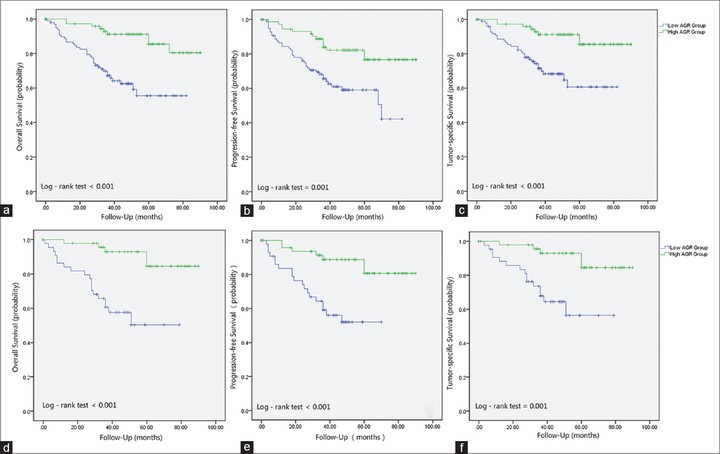The prognostic value of preoperative serum albumin-globulin ratio for high-grade bladder urothelial carcinoma treated with radical cystectomy: A propensity score-matched analysis

Abstract
Objectives: Albumin-globulin ratio (AGR) has been reported as an independent risk factor for survival outcomes of a variety of malignancies. We aimed to further examine the prognostic value of AGR for urothelial carcinoma of bladder (UCB) using a propensity score-matched (PSM) analysis.
Materials and methods: The medical data of 189 high-grade UCB patients undergoing radical cystectomy were retrospectively reviewed. AGR was defined as the ratio of serum albumin to nonalbumins (serum total protein-albumin). The association of preoperative AGR with clinicopathologic characteristics and prognosis were assessed. Multivariate analyses using Cox regression models were applied to evaluate the independent prognostic factors.
Results: The receiver operating curve analysis indicated 1.55 as the optimal cutoff value to define low or high AGR. In prematched cohorts, Kaplan-Meier analysis indicated that AGR lower than 1.55 was associated with poorer overall survival (OS), progression-free survival (PFS), and tumor-specific survival (TSS) (P < 0.001 for all). Multivariable cox analyses also showed that AGR lower than 1.55 were an independent risk factor for survival outcomes, including OS, PFS, and TSS (P < 0.01 for all). In particular, AGR lower than 1.55 remained its prognostic value after PSM analysis.
Conclusion: Low AGR was a significant unfavorable factor for UCB patients treated with radical cystectomy. This viable parameter should be enrolled in the pretreatment risk stratification for UCB.